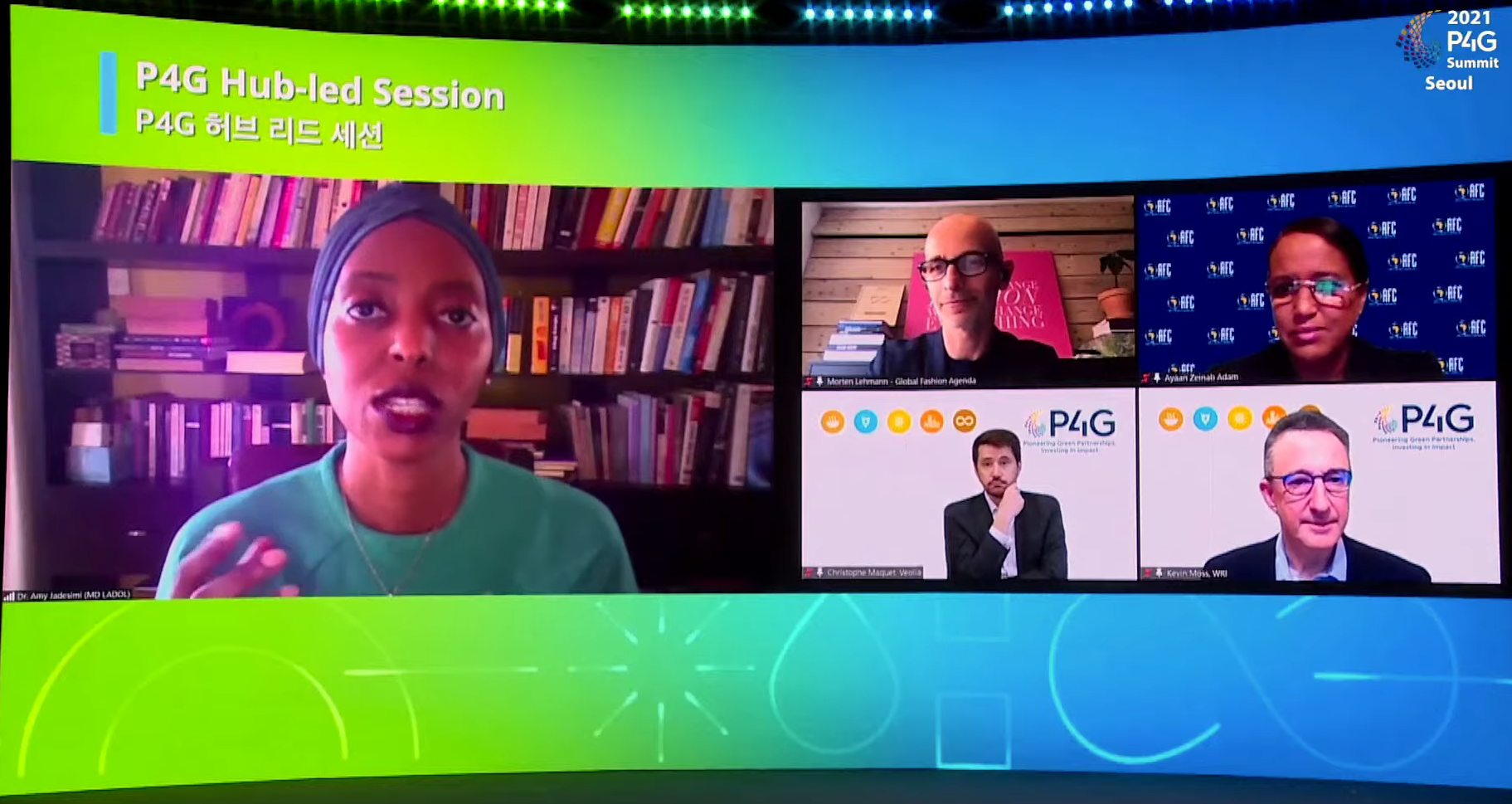P4G Summit Session on Circular Economy Accelerates Innovative Solutions for Green Growth

Subject
P4G Summit
Country
Bangladesh, Denmark, Indonesia, Kenya, The Republic of Korea
Publication Date
2021-06-01
About
The 2021 P4G Seoul Summit Thematic Session on “Circular Economy Measures towards a Zero Waste Society” featured an engaging discussion with key P4G champions advocating for innovative solutions to generate green growth. Moderated by Kevin Moss, Global Director, Center for Sustainable Business, World Resources Institute, this session emphasized the need to optimize the use of all resources and materials for a just, circular transition.
Kicking off the keynote remarks, Faruque Hassan, President, Bangladesh Garment Manufacturers and Exporters Association highlighted the link between the need to build back better for a garment industry hit hard by COVID-19 and the opportunity to shift the fashion business model to a circular one. With Bangladesh’s prominent role in textile production, Hassan urged stakeholders to strengthen the local ecosystem for circularity, as Bangladesh’s garment industry seeks to close the loop for a just transition.
Dr. Julius Muia, Principal Secretary, National Treasury and Planning, Kenya, emphasized Kenya’s priorities of green manufacturing where the government has collaborated with P4G to accelerate sustainable industrial clusters, making them feasible and profitable. Dr. Muia remarked that P4G has provided a proven roadmap model of implementation through sustainable clusters that will help Kenya achieve its climate ambitions while driving forward economic growth.
Suharso Monoarfa, Minister of National Development and Planning, Indonesia, outlined his country’s commitment to circular economy as essential to meeting the sustainable development goals. Through Indonesia’s Vision 2045 and Green National Development plan, Indonesia has defined low-carbon and climate resilient development as a national priority while integrating circular economy strategy throughout the plans. “We are optimistic that with collaboration of all stakeholders, economic transformation through low-carbon development and circular economy can be a long-term solution for Indonesia,” Minister Monoarfa said.
In the panel discussion, key changemakers shared their lessons learned from implementing circular economy business models, as well as what P4G can do to further scale their agendas. Amy Jadesimi, CEO, Lagos Deep Offshore Logistics Base, introduced her work with the P4G Partnership, SSEZ/Sustainable Industrial Clusters, which transformed LADOL Free Zone from a disused area into a fully integrated logistics space. “The industrialization of Africa using the blueprint that’s been created by LADOL in partnership with P4G that creates special economic zones that are industrial and sustainable is possible, it is profitable, and it is the preferable way to industrialize across the entire continent,” remarked Jadesimi.
Building on Faruque Hassan’s keynote remarks about Bangladesh’s sustainable fashion transition, Morten Lehmann, Chief Sustainability Officer, Global Fashion Agenda, framed the business opportunity to turn waste turned into a new valuable resource and attract investment for commercial sustainability. Through partnerships such as P4G’s Circular Fashion Partnership, Lehmann noted the value of engaging all stakeholders to ensure equity and inclusion.
Highlighting the role of plastics in the circular economy, Christophe Maquet, Senior Executive Vice President, Veolia Asia, presented the 3RI Partnership with P4G as a pioneering initiative that creates a market-based mechanism through plastic credit financing. This method urges the private sector to take action to reduce total plastic use throughout the value chain in a transparent and socially inclusive way.
Ayaan Zeinab Adam, Senior Director, Africa Finance Corporation, emphasized the need for local infrastructure development in Africa, especially in power, transport and logistics. Adam highlighted the need to work with platforms like P4G to mobilize institutional capital to translate development efforts into real projects that are financeable and bankable. This will enable African companies to build resilient infrastructure that is affordable, can attract capital, and offset climate costs.
The diverse group of panelists working on sustainable industrialization, circular fashion, and plastics recycling all emphasized the value of P4G in bringing together international cooperation for local implementation.
Stephan Sicars, Managing Director, Directorate of Environment and Energy, UN Industrial Development Organization closed the session by reiterating the business case for circular economy solutions, whereby stakeholders must adopt a whole of society and inclusive approach, facilitate partnerships, and ensure policy coordination. He summed up the discussion by validating the importance of innovative zero waste partnerships in testing and implementing viable circular economy models that could deliver a just transition.
Watch the full session recording here.
